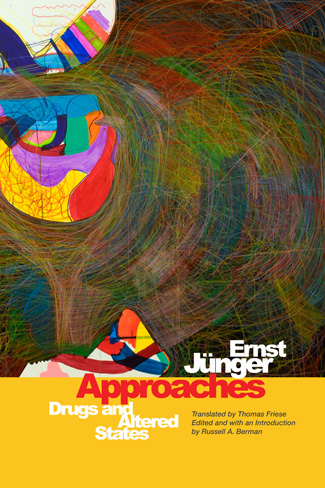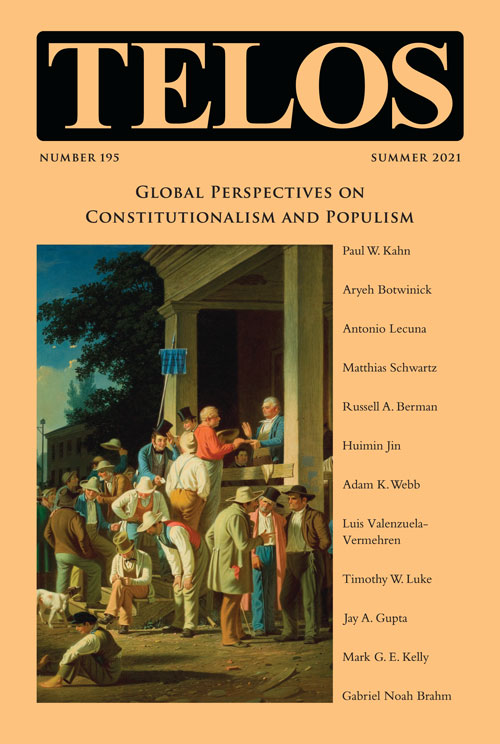By Telos Press · Monday, December 5, 2022 New from Telos Press: Approaches: Drugs and Altered States, by Ernst Jünger. Order the paperback edition today in our online store and save 20% by using the coupon code BOOKS20. Also available in Kindle ebook format at Amazon.com.
Approaches: Drugs and Altered States
by Ernst Jünger
Translated by Thomas Friese
Edited and with an Introduction by Russell A. Berman
 Telos Press Publishing is delighted to announce the publication of Ernst Jünger’s Approaches: Drugs and Altered States, now available in English translation. Telos Press Publishing is delighted to announce the publication of Ernst Jünger’s Approaches: Drugs and Altered States, now available in English translation.
In Approaches, Jünger describes his experiences with drugs over the course of his life, ranging from youthful drinking sprees, through experiments with hashish and morphine, to more powerful psychotropic substances like mescaline, peyote, and LSD. Taking his readers on a remarkable journey from beer to hallucinogens, he provides fascinating vignettes from key moments in Germany’s troubled twentieth century. Approaches is also a fundamentally philosophical, even spiritual journey toward hidden dimensions of existence that, in Jünger’s view, have been eclipsed by the ambient noise of modern life. The ecstatic altered states provided by drug use, he claims, can help us approach them and find a deeper truth.
Continue reading →
By Russell A. Berman · Thursday, August 12, 2021 Renaud Girard is an American-born French journalist, the author of several books on world affairs, especially the Middle East. In this trenchant commentary on the Afghan debacle, he recognizes the defeat for what it is, bluntly invoking the collapse of the imperial German army at the end of the First World War. Is that an overstatement or an unflinching naming of the collapse of an order? Girard brings a realist eye to the factors that have contributed to the current situation, asking us to understand them and their consequences, as the Taliban proceed from city to city, heading toward Kabul.
Continue reading →
By David Pan · Monday, June 28, 2021 The following commentary is based on a text that appeared originally in German in Junge Freiheit. An English translation of the interview with Hans-Georg Maaßen in Die Weltwoche has been posted separately today in TelosScope, here.
The interview with Hans-Georg Maaßen documents his reactions toward the charge of anti-Semitism against him by several German media outlets in the last few weeks since he announced his candidacy for the German Bundestag. The controversy has revealed more about the deterioration of the German media landscape than about Maaßen’s own views and character. Spurred on by a charge against him of racism and anti-Semitism by climate activist Luisa Neubauer on ARD’s political talk show Anna Will, media outlets scoured Maaßen’s writings with the hope of giving their accusations some substance. The dearth of the evidence against him led them in the end to an article that he published with Johannes Eisleben in English in TelosScope. But rather than engaging with the specific arguments of the article, the commentators have engaged in a kind of witch hunt.
Continue reading →
By Henryk M. Broder · Monday, June 28, 2021 The following interview appeared originally in German in Die Weltwoche on June 18, 2021. Translated into English by Xuxu Song. A separate commentary by David Pan appears here.
Hans-Georg Maaßen, President of Germany’s Federal Office for the Protection of the Constitution from 2012 to 2018, is accused of spreading anti-Semitic ideas. The accusation comes from the milieu of the “Fridays for Future” movement. The timing, Maaßen suspects, is no coincidence and has nothing to do with the political climate. Rather, they want to prevent his election as a member of the Bundestag.
Continue reading →
By David Pan · Friday, June 18, 2021 Telos 195 (Summer 2021): Global Perspectives on Constitutionalism and Populism is now available for purchase in our store. Individual subscriptions to Telos are also available in both print and online formats.
 After watching the images of the January 6 Capitol riot, many Americans concluded that right-wing populism threatens the basic rules of our constitutional order. In this view, the U.S. Constitution establishes a universal order that is detached from any particular orientation and provides the neutral ground upon which differences can be discussed, while populists upset the rules of discussion and destroy the basis of a common project. Consequently, since populism is at odds with the Constitution, the solution would be to try to reimpose a measure of rationality upon the unruly. Yet the nagging concern behind this perspective is not just the violation of rules but the suspicion that populism is ultimately motivated by racism and sexism. In this case, the real opposition would not be between constitutionalism and populism but between two understandings of the Constitution, that is, two conceptions of the character of the people, one egalitarian and the other racist. The difficulty is that the laws of a constitution cannot exist independently of a people with a specific history. Rules cannot be neutral but imply a perspective on the world, and the conflict between constitutionalism and populism may in fact be a symptom of a conflict between two factions within the people, each of which is attempting to establish itself as the proper representation of the will of the people as a whole. After watching the images of the January 6 Capitol riot, many Americans concluded that right-wing populism threatens the basic rules of our constitutional order. In this view, the U.S. Constitution establishes a universal order that is detached from any particular orientation and provides the neutral ground upon which differences can be discussed, while populists upset the rules of discussion and destroy the basis of a common project. Consequently, since populism is at odds with the Constitution, the solution would be to try to reimpose a measure of rationality upon the unruly. Yet the nagging concern behind this perspective is not just the violation of rules but the suspicion that populism is ultimately motivated by racism and sexism. In this case, the real opposition would not be between constitutionalism and populism but between two understandings of the Constitution, that is, two conceptions of the character of the people, one egalitarian and the other racist. The difficulty is that the laws of a constitution cannot exist independently of a people with a specific history. Rules cannot be neutral but imply a perspective on the world, and the conflict between constitutionalism and populism may in fact be a symptom of a conflict between two factions within the people, each of which is attempting to establish itself as the proper representation of the will of the people as a whole.
Continue reading →
By Russell A. Berman · Wednesday, April 28, 2021 Criticism of identity politics is hardly new. The insistence on—or “celebration” of—fractional community identities rather than a common good was presented as an explanation for Hillary Clinton’s defeat in the 2016 presidential election. No coalition of separate groups will ever be able to muster the political magnetism of an inclusive rhetoric of national solidarity. That is the first problem: how identity politics divides, rather than unites.
However in addition to the problems of fragmentation and exclusion, the very focus on “identity,” a cultural and psychological concept, has always distracted from material issues of political economy, redirecting debate toward symbols and selfhood. Christopher Lasch labeled this a Culture of Narcissism as early as 1979. At stake is both a tendency toward subjectification within contemporary society and a transformation of the—often primarily academic—discussion about this society, as critical attention shifted toward subjective elements rather than discriminatory conditions and economic processes. If you want to hide class difference, identity politics is just what you need.
Continue reading →
|
|
 Telos Press Publishing is delighted to announce the publication of Ernst Jünger’s Approaches: Drugs and Altered States, now available in English translation.
Telos Press Publishing is delighted to announce the publication of Ernst Jünger’s Approaches: Drugs and Altered States, now available in English translation.


